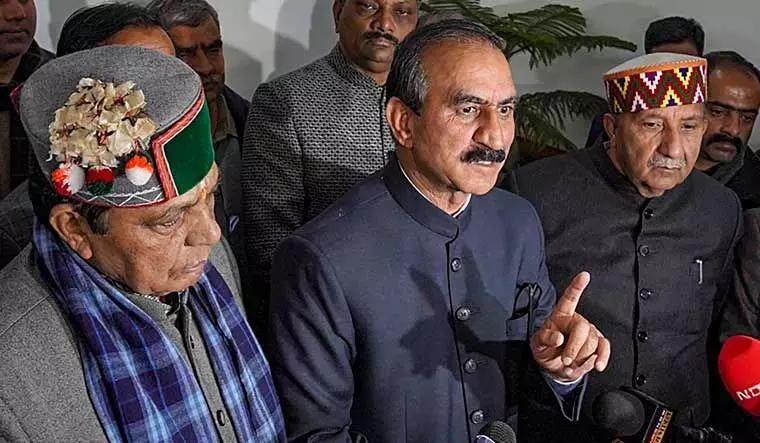Manufactured dissent?

The recent turn of events in Himachal Pradesh's political landscape, which led to the unexpected victory of the BJP for the lone Rajya Sabha seat in the state, has triggered a cascade of uncertainties, leaving the state government teetering on the brink of political chaos. This seismic shift in power dynamics can potentially trigger governance crisis and undermine the political integrity of the state. Furthermore, the defeat suffered by the Congress, despite its numerical dominance in the assembly, also exposes the vulnerabilities within the party's ranks and the fragility of its hold on power. The party, however, has exuded confidence in its political cohesion, the tactical onslaught by the Opposition notwithstanding.
The BJP's strategic nomination of Harsh Mahajan, a former Congress leader, as a candidate, coupled with adept political manoeuvring, enabled it to secure crucial cross-votes from 6 Congress and three independent MLAs, thereby tilting the scales in its favour. Considering the reports suggesting Congress MLAs being “in touch” with the BJP, the outcome raises pertinent questions about the ethical conduct of elected representatives and the integrity of the democratic process. Evidently, the dissatisfaction of the Congress MLAs with party’s ranks is not the sole factor behind the shocking results; the influence of the external hand might also have a role to play.
Confident of retaining power, senior Congress leader DK Shivkumar questioned the worrisome “extremes to which the BJP is going in terms of acquiring power, deliberately attempting to crush democracy and public mandate in the process.” These allegations start making sense when seen against the toppling of several non-BJP governments in the recent past. Meanwhile, sensing opportunity, BJP leader Jai Ram Thakur has upped the ante, claiming that “the Congress government has no right to remain in power”. He also met Governor Shiv Pratap Shukla seeking a division of votes on the Budget, through which MLAs’ votes on a motion are recorded, as opposed to a voice vote in which individual MLAs’ decisions are not recorded. It may be noted that the failure to pass the Budget could precipitate a full-blown governance crisis. The BJP's insistence on a division of votes is apparently aimed at stoking polarisation within the assembly. Prima facie, the fate of the Budget appears to hang in the balance, contingent upon delicate political negotiations and last-minute alliances.
However, as a matter of fact, the Congress looks well poised to pass the Budget, and hence retain power. Even in the case where potential “rebels” vote against the whip of the Congress party, there are fair chances they would be disqualified under the defection law, putting Congress in a comfortable position, number-wise. Additionally, the expulsion of BJP MLAs may also impact the numbers in Congress’ favour.
Nevertheless, the internal rifts and factionalism in the INC cannot be denied, as evidenced by the resignation of senior leader Vikramaditya Singh and murmurs of discontent among other party members. The party's failure to present a united front emboldens its opponents, paving the way for opportunistic alliances and power plays. Such tactics not only undermine the sanctity of the electoral process but also erode public trust in the political establishment, fostering disillusionment and disenchantment among the electorate. In light of these developments, it is imperative for all stakeholders to prioritise the interests of the state and its citizens above partisan considerations. The sanctity of democratic institutions must be safeguarded, and the rule of law upheld, to ensure a fair and transparent end to the ongoing political impasse.




